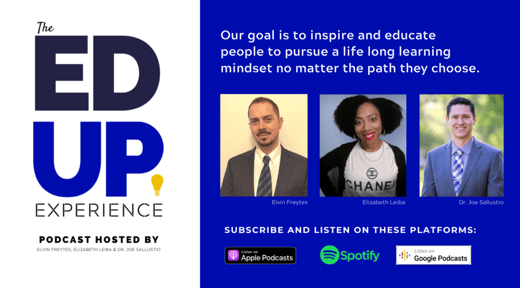Published on
Illustrating the Value of Education to Prospective Students

With the disruption of the pandemic, students are questioning the value of education, and institutions need to step up and show them its importance, especially now. In this interview, Joe Sallustio and Elizabeth Leiba talk to Irma Becerra about how Marymount University shifted their strategic plans in light the pandemic, how to help students see their potential, and the importance of encouraging students to see the opportunities within the disruption as a way to get back into the workforce.
EdUp Experience: What was the process behind the decision-making to welcome back students?
Irma Becerra (IB): When the outbreak first occurred, we knew we had to transition all courses online. At that time, no one really expected what would follow this worldwide stay-at-home lockdown, which was necessary to preventing the overload of healthcare systems everywhere. Marymount differentiated itself by having a very personalized education. And students who come to Marymount really love the face-to-face environment.
Online is not the prevailing mode of course delivery for everyone. We actually pivoted in a matter of days and moved 700 face-to-face courses online. You can imagine that this was a big lift for us, but I’m very happy that we were thoughtful about it. Students had gone on spring break; many of them were spread out around the world because we have a very active Global Scholars Program. We told students to stay home. If they needed to come pick up their belongings from the residence halls, we did it in a way that everybody kept safe and didn’t pose any threats.
Now, we’re in the process of repopulating the campus because students told us they wanted to come back. So, we’re making all the necessary restructuring changes for them to return safely and learn the way that they like to learn.
EdUp Experience: How has the pandemic affected your strategic plan known as Momentum?
IB: We have continued to work on it throughout this pandemic. In our strategic plan, our vision is that Marymount will be nationally recognized, and we want to do this within the next three or four years. We’re starting our second year of implementation.
That whole process happened quite quickly and involved not only the entire Marymount University faculty and staff, but also students, alumni, board members and community leaders involved with our university. It was a very comprehensive, engaged effort because we all understand that Marymount has the potential to achieve national recognition, and we want to take it there. There are four pillars in our strategic plan. One is our focus on our distinctive identity.
This is a student-centered learning community that values diversity and focuses on the education of the whole person. This idea revolves around personalized education and really focuses on getting our students to succeed. I have made a personal commitment that we will do everything on our part to see that every Marymount student earning their bachelor’s degree graduates in four years or less. That’s a big commitment on our side.
Our country needs us to pivot, and we want our students to be prepared for that. We’re not only facing a healthcare crisis but also a financial and a civil rights crisis. A new set of skills will be needed, and we have been busy creating bridges so that students can acquire that news quickly to help rebuild our economy.
The third pillar to our strategic plan is our vibrant economy. We’ve been investing in the right tools to enable a high-performing culture. We’ve successfully completed the first phase of our cloud-based system workday, even in the pandemic, and are starting the second phase. As you can see, it doesn’t matter that we’re in the middle of a pandemic; we’re doing everything possible to restore learning the way our students wanted.
EdUp Experience: How did your journey to becoming president affect your decision-making?
IB: I have to say, if you would have asked me when I was a young PhD student if I want to be university president one day, I would have never imagined that that would be my path. When people ask me for career advice, I never think about a job as a steppingstone. But I do recognize that every job I’ve done has prepared me to do the job that I’m doing now. I’m a big believer in not jumping over steps but enjoying every step.
EdUp Experience: What do you think makes the difference when we’re looking at how to help our students that don’t see their potential?
IB: I was always told that no matter what happens, no one can ever take away your education. Those words have made an imprint on me ever since. How can you foresee what you need to be resilient? The only thing that gives you resilience is education. I’ve always turned to education even in my most difficult times, and that’s help build my own resilience.
What’s really important is to have mentors, especially those with underrepresented minority backgrounds who may not have career mentors in their families but seek ones out there. Advice and mentorship lend a hand to students who have a harder time seeing their potential.
EdUp Experience: What do you say to those who question the value of formal education?
IB: It’s a topic I’m very passionate about because the single most important investment that any one person can make in themselves is their college degree. When I hear that a college degree isn’t for everyone, I wonder who is being left out. Education is the great equalizer. There are so many great jobs out there that still require a college degree. And it’s important to finish that degree if you’ve already started it. It’s an all-or-nothing game.
Research shows that those with a college degree will earn a minimum of two million dollars over their lifetime—that’s a huge return on investment. I’m a strong believer that students should make that their number one priority. A college degree is your ticket into a job. Once you’re there, you can pivot however you want. For some families, education is the only inheritance, so you have to focus on crossing the finish line when it comes to college education.
EdUp Experience: How do we ensure students see the value in education and that the colleges offer programs that illustrate this value.
IR: Marymount isn’t really a traditional liberal arts education in the sense that we were always very practically focused and that was underpinned by the liberal arts. Our top programs are nursing and physical therapy. We also have interior design, fashion, business and technology courses. So, we are very focused on the market and the opportunities within the market. We want our students to be prepared for the world because about 20% of our population is international.
One of the things that we’re doing right now is integrating artificial intelligence throughout the curriculum because it is going to be the next transformative thing in our lives and careers. We want to make sure that not only students studying cybersecurity or traditional technology-based careers understand how AI affects their disciplines but students in other fields as well. We want to continue to innovate and focus on what’s next.
Our idea is to offer certificates at the graduate level. These can then be stacked to form a master’s degree. Students can choose their own certificates and stack them to create a master’s in emerging technologies. We’re giving students the opportunity to upscale, rescale and even earn new degrees.
We have degrees that allow a student who already has a degree to change careers within a year of immersion. That’s something new in academia. We’re looking to prepare learners not only for the workforce but for career changes and employment unpredictability.
EdUp Experience: Is there anything you want to share about Marymount University and what you think the future of higher ed looks like?
IB: There isn’t a better time to be in school than now. The job market is very difficult, so you want to prepare yourself for the future. The country needs nurses, cybersecurity, engineers, psychologists—we need to rebuild our economy together. Marymount is prepared to provide these skills to get students into the workforce and help them find their purpose.
On a personal note, I just want to encourage everyone to not give up. Be tenacious; don’t let anyone tell you otherwise. This country has endless opportunities—follow your dreams.
Listen to the full interview here.

Disclaimer: Embedded links in articles don’t represent author endorsement, but aim to provide readers with additional context and service.
Author Perspective: Administrator



